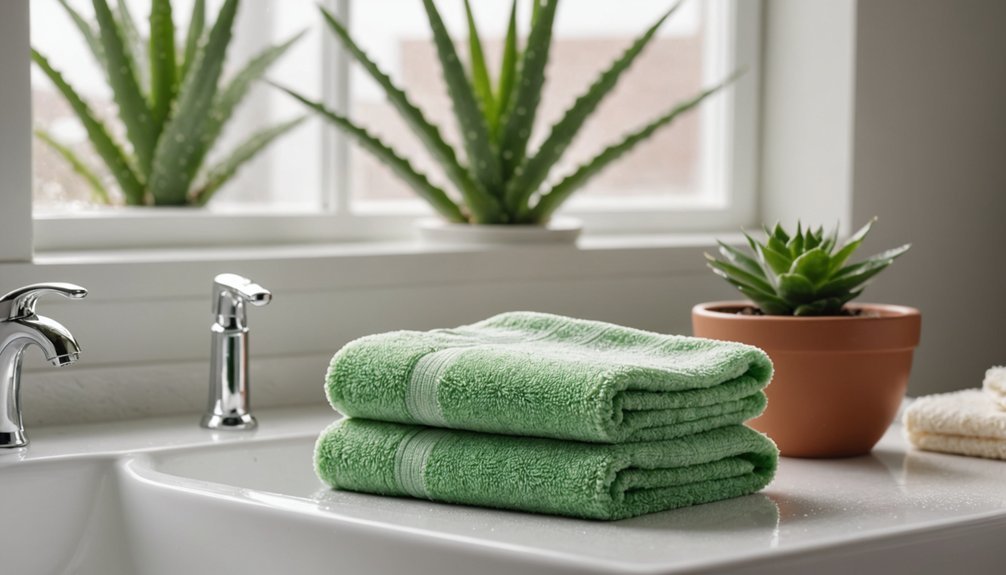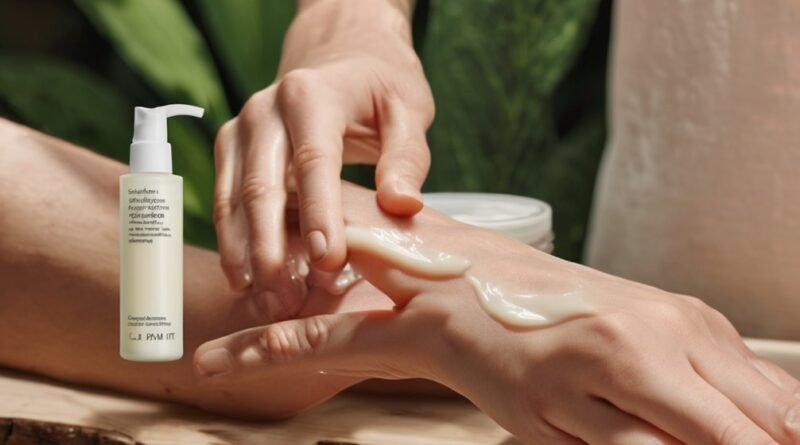How to Stop Bed Bug Bites From Itching
If you’re dealing with bed bug bites, you’ll quickly discover that the itching can become unbearable. While these pesky insects leave behind irritating welts that can last for days, you don’t have to suffer through the constant urge to scratch. From simple home remedies to medical treatments, there are several effective ways to find relief from bed bug bites and prevent potential complications that could make matters worse.
Key Takeaways
- Apply a cold compress or ice pack wrapped in cloth for 20 minutes every two hours to numb the area.
- Take oral antihistamines like Benadryl or Zyrtec to reduce itching and inflammation symptoms.
- Use over-the-counter hydrocortisone cream or calamine lotion directly on bite areas for immediate relief.
- Create a paste with baking soda and warm water, then apply to affected areas for 15 minutes.
- Keep the bite area clean with mild soap and lukewarm water, avoiding vigorous scrubbing that could worsen itching.
Essential Hygiene Practices for Bite Relief

When bed bug bites strike, proper hygiene becomes your first line of defense against persistent itching and potential infections.
Start by gently washing the affected areas with lukewarm water and mild soap to remove irritants and bed bug saliva. Don’t scrub vigorously, as this can worsen itching and break the skin. Applying a cold compress immediately after washing helps numb the area and reduce inflammation.
Keep the bitten areas clean and dry, as moisture can increase discomfort and infection risk. If you have children, trim their nails short and monitor their bites carefully.
You’ll also need to maintain clean laundry habits – wash bedding, clothes, and affected fabrics in hot water and dry on high heat.
Remember to keep your hands clean and nails trimmed to prevent introducing bacteria if you accidentally scratch the bites.
Quick Home Remedies to Soothe Itchy Bites

Four powerful home remedies can provide quick relief from bed bug bite itching.
These red, itchy bumps commonly appear in zigzag patterns on exposed skin.
Apply a cold compress or ice pack wrapped in cloth for up to 20 minutes every two hours to numb the skin and reduce inflammation.
Cold compresses numb skin and reduce swelling when applied for 20 minutes every two hours, bringing quick relief to irritated areas.
Mix baking soda with warm water to create a paste and apply it to bites for 15 minutes, leveraging its anti-inflammatory properties.
Dilute tea tree or lavender essential oil with a carrier oil like coconut oil and gently dab it on affected areas to reduce swelling and infection risk.
You can also use natural astringents like witch hazel or diluted apple cider vinegar on a cotton ball to cleanse and soothe bite sites.
Remember to wear loose cotton clothing and avoid scratching to prevent further irritation and infection.
Over-the-Counter Treatment Options

You’ll find quick relief from bed bug bites with over-the-counter antihistamine pills like Benadryl or non-drowsy alternatives like Zyrtec and Claritin.
Most bites will heal on their own within one to two weeks if left untreated.
Applying hydrocortisone cream or calamine lotion directly to the affected areas can reduce inflammation and soothe the itching sensation.
For a natural approach, you can try OTC plant-based anti-itch products alongside cold compresses to minimize discomfort and swelling.
Antihistamine Pills and Creams
Two effective over-the-counter options can help relieve the intense itching from bed bug bites: antihistamine pills and creams.
You can take oral antihistamines like Benadryl, Claritin, or Zyrtec to block histamine receptors and reduce itching, especially before bedtime. These pills work well for moderate to severe reactions when topical treatments aren’t enough.
For localized relief, you can apply antihistamine creams directly to bite areas. These topical treatments cause fewer systemic side effects than pills and work best for mild to moderate itching. Since bites may take up to 14 days to appear, starting treatment promptly when symptoms emerge is important.
However, don’t use them on broken skin or severe reactions. Remember to clean the affected area with soap and water first, and follow dosage instructions carefully.
If you experience severe swelling, blistering, or breathing difficulties, seek immediate medical attention.
Cooling Hydrocortisone Solutions
Among over-the-counter treatments, hydrocortisone solutions provide powerful relief for bed bug bite itching through their cooling and anti-inflammatory properties.
You’ll find this medication in cream, ointment, and lotion forms – each suited for different skin types and affected areas.
Apply 1% hydrocortisone cream once or twice daily, spacing applications 8-12 hours apart. Use about a fingertip-sized amount to cover an area twice the size of your palm. Clean the affected area thoroughly with soap and water before each application.
The cream works by reducing inflammation and suppressing your immune response at the bite site, which helps calm the itching and swelling.
Don’t use hydrocortisone for more than seven days straight, and avoid applying it to broken skin or infected areas.
If your bites worsen or show signs of infection, consult your healthcare provider for stronger treatment options.
Natural Anti-Itch Products
While prescription medications offer strong relief, natural anti-itch products provide effective and gentler alternatives for treating bed bug bites.
You’ll find quick relief with aloe vera gel, which reduces swelling and redness while preventing infection. Witch hazel acts as a natural astringent to tighten skin and ease irritation, while properly diluted tea tree oil offers both anti-inflammatory and antiseptic benefits.
For widespread itching, try oral antihistamines like Benadryl or non-drowsy options such as Zyrtec and Claritin.
You can also make a simple baking soda paste or apply calamine lotion to dry out bites and stop itching. Essential oils like peppermint and lavender, when properly diluted, can both soothe your skin and help repel bed bugs from the treated area.
Prescription Medications for Severe Cases
If your bed bug bites are causing severe discomfort, you’ll need to talk with your doctor about prescription-strength antihistamines like cetirizine or loratadine for systemic relief.
Your doctor might also prescribe topical corticosteroid creams to reduce inflammation and control intense itching when over-the-counter treatments aren’t working.
These medications often work best when used together, giving you a two-pronged approach to managing severe bite reactions.
Strong Antihistamine Options Available
For severe bed bug bite reactions that don’t respond to over-the-counter remedies, prescription antihistamines offer powerful relief options.
Your doctor may prescribe hydroxyzine, which helps with both itching and anxiety, or non-drowsy alternatives like fexofenadine or desloratadine.
In cases where you need immediate relief, injectable antihistamines such as diphenhydramine or chlorpheniramine can provide rapid symptom control under medical supervision.
If you’re experiencing a severe allergic reaction, you’ll need epinephrine alongside antihistamines.
For long-term management, your doctor might recommend newer-generation antihistamines like levocetirizine or doxepin.
These medications are particularly effective for persistent itching, though they don’t address the underlying bed bug infestation.
Remember that you’ll need to combine antihistamine treatment with proper pest control measures.
Topical Steroid Treatment Plans
When bed bug bites cause severe reactions, prescription-strength topical steroids offer significant relief from intense itching and inflammation.
Your doctor may prescribe a potent Class I steroid like clobetasol propionate for severe cases, or a mid-potency option for moderate reactions.
You’ll need to apply the steroid cream or ointment directly to affected areas, avoiding open wounds.
Don’t use these medications on your face or groin without specific medical guidance.
While effective, you shouldn’t use topical steroids long-term due to potential side effects like skin thinning.
In extreme cases where topical treatments aren’t enough, your doctor might prescribe oral steroids like prednisone.
However, this is rare and reserved for widespread reactions that haven’t responded to other treatments.
Signs of Infected Bites and What to Do
Bed bug bites can become infected when excessive scratching breaks the skin’s protective barrier.
You’ll know your bites are infected if you notice increasing redness, swelling, warmth, or pus around the bite sites. Watch for red streaks extending from the bites, which may indicate spreading infection.
If you suspect infection, clean the area immediately with soap and water, then apply an over-the-counter antibiotic ointment.
Don’t scratch the bites, as this will worsen the condition. Seek medical attention if you develop fever, enlarged lymph nodes, or if the skin becomes hard and painful.
To prevent infection, keep your bedding clean, treat bites promptly with anti-itch medication, and trim your nails to minimize damage from inadvertent scratching.
Monitor bite sites daily and act quickly if you notice signs of infection.
Special Care Tips for Children and Sensitive Skin
Children and individuals with sensitive skin need gentler approaches to manage bed bug bites, since their skin is more susceptible to irritation and infection.
Choose hypoallergenic, fragrance-free products and avoid adult-strength medications without your doctor’s approval.
Keep your child’s nails trimmed short and cover bites with breathable bandages to prevent scratching, especially at night.
You can use child-friendly calamine lotion or low-strength hydrocortisone cream to relieve itching, but always wash the affected areas with mild soap and warm water first.
Watch for signs of allergic reactions or infections, including unusual swelling, blistering, or fever.
If these symptoms occur, seek immediate medical attention.
For babies and toddlers, you’ll need to monitor them more closely as they’re at higher risk for complications from scratching.
Prevention Strategies to Avoid Future Bites
To effectively prevent future bed bug bites, you’ll need a detailed strategy that combines vigilant monitoring, proper containment methods, and smart travel practices.
By implementing extensive prevention measures, you can greatly reduce your risk of experiencing more bites.
- Install high-quality mattress encasements and ClimbUp™ devices under bed legs to create barriers that trap existing bugs and prevent new ones from reaching you while you sleep.
- Regularly inspect your bedding and furniture seams for dark spots, blood stains, or shed skins – catching an infestation early makes it easier to control.
- When traveling, keep luggage off beds and carpets, using hard surfaces like bathtubs instead, and always inspect hotel rooms before unpacking.
- Immediately wash and dry all clothing on high heat after trips, and steam-clean suitcases before bringing them inside your home.
Conclusion
You’ll find relief from bed bug bites by following proper hygiene, applying home remedies, and using appropriate medications. Don’t forget to monitor bites for signs of infection and seek medical help if needed. While treating current bites is essential, it’s equally important to address the underlying infestation. Take preventive measures to protect yourself and your family from future bed bug encounters.

